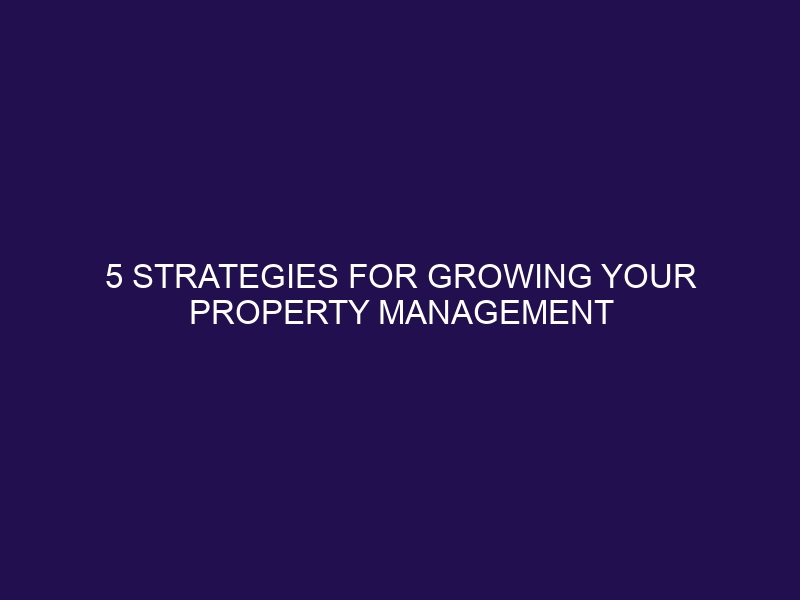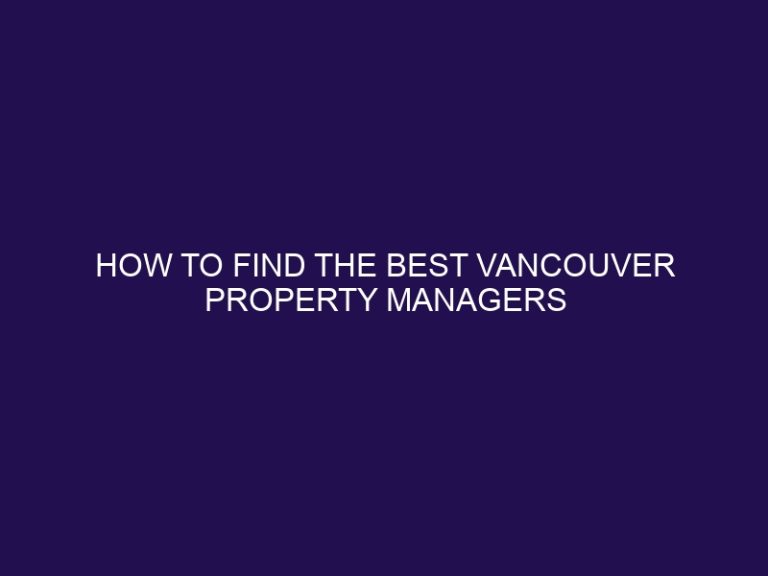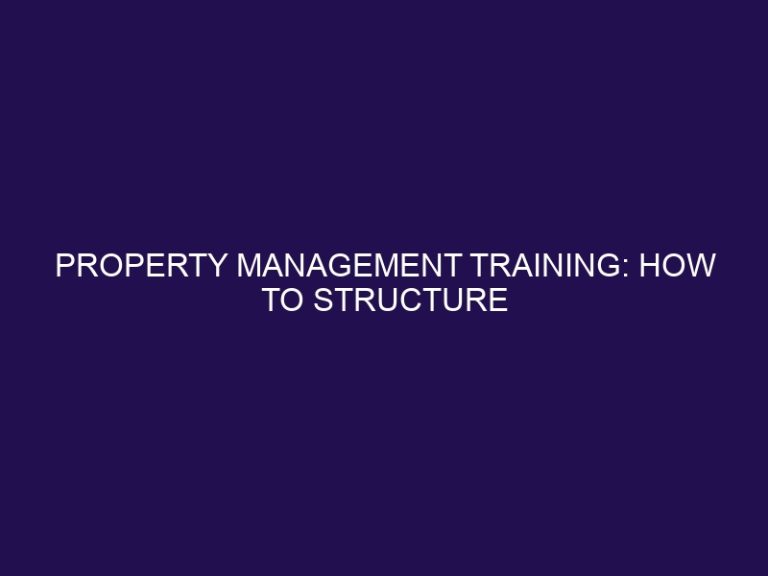5 Strategies for Growing Your Property Management Business
Growing a property management business requires effective strategies to attract clients, establish a strong brand, and provide exceptional service. By implementing these strategies, you can expand your business and increase its profitability. Here are five key strategies for growing your property management business.
Strategy 1: Establishing Strong Networking Channels
Building relationships with real estate agents, collaborating with local contractors, and engaging with property owners associations can help you expand your network, gain referrals, and establish credibility within the industry.
Strategy 2: Developing Effective Marketing Techniques
Creating a professional website and online presence, utilizing social media platforms, and implementing targeted advertising campaigns will help you reach a wider audience, generate leads, and showcase your expertise and value to potential clients.
Strategy 3: Providing Exceptional Customer Service
Hiring and training knowledgeable staff, promptly responding to tenant inquiries and concerns, and regularly inspecting and maintaining properties will ensure that your clients receive top-notch customer service. Happy clients are more likely to refer your services to others and continue working with you.
Strategy 4: Implementing Efficient Property Management Systems
By adopting property management software, streamlining rent collection and maintenance requests, and keeping accurate financial records, you can improve operational efficiency, reduce costs, and enhance the overall management of properties under your care.
Strategy 5: Expanding and Diversifying Your Portfolio
Acquiring new properties, offering additional services to property owners, and exploring new geographical areas will help you expand and diversify your portfolio. This can lead to increased revenue streams and a broader client base.
By implementing these strategies, you can position your property management business for growth and success in a competitive industry. Through networking, effective marketing, exceptional service, efficient systems, and strategic expansion, you can take your business to new heights.
Strategy 1: Establishing Strong Networking Channels
In the world of property management, one key strategy stands out above the rest: establishing strong networking channels. This powerful approach can open doors to endless opportunities for growth and success. From building relationships with real estate agents to collaborating with local contractors and engaging with property owners associations, this section will delve into the strategies that will help propel your property management business forward. Get ready to learn the secrets to expanding your network and reaching new heights in the industry!
Building Relationships with Real Estate Agents
- Building relationships with real estate agents is of utmost importance for the growth of your property management business. Here are some steps you should consider to foster these connections:
- Attend various real estate events and networking functions to meet and connect with agents who can be valuable allies in your endeavors.
- One effective strategy is to offer referral incentives to agents who refer clients to your exceptional management services, further strengthening your partnership.
- Stay up-to-date on local market trends, and share this valuable knowledge with agents. This will help establish yourself as a respected industry expert and enhance your credibility.
- Collaboration with agents on property listings is crucial. Provide them with insightful resources and valuable insights, enabling them to effectively market the properties.
- Always prioritize excellent service and maintain open lines of communication with agents. This will build trust and further solidify your professional relationships.
Collaborating with Local Contractors
Collaborating with local contractors is not just important but it is a vital strategy for the growth of your property management business. One of the key ways to ensure efficient and high-quality maintenance and repair services for your properties is by forming strong partnerships with reliable local contractors. If you are wondering how to effectively collaborate with these contractors, follow these steps:
- Start by conducting thorough research to identify reputable local contractors who specialize in areas such as plumbing, electrical work, and landscaping.
- Once you have shortlisted potential contractors, take the time to develop a strong working relationship with them. Clear and open communication is the foundation of any successful partnership, so make sure you communicate your expectations and requirements clearly.
- To streamline the process and ensure prompt response times for maintenance and repair requests, establish clear lines of communication with your chosen contractors. This will help in efficient coordination and resolution of any property-related issues.
- Don’t forget to negotiate pricing and service agreements with the contractors. It is important to ensure that both parties agree to fair and competitive rates that benefit your property owners.
- Regularly assessing the performance of the contracted services is crucial. Seek feedback from property owners to ensure their satisfaction and make any necessary improvements.
By collaborating closely with local contractors, you can confidently deliver reliable and efficient services to your property owners. This, in turn, will enhance the reputation and growth of your property management business.
Engaging with Property Owners Associations
Engaging with property owners associations is a crucial tactic for expanding a property management business. By fostering strong relationships with these associations, property managers can gain access to a network of potential clients and valuable industry insights. They can actively participate in association meetings, attend events, and offer their expertise to members. This active involvement helps establish trust and credibility within the community and enhances the likelihood of receiving referrals. Since property owners associations often have specific guidelines and regulations, it is essential for property managers to concur and actively engage to ensure compliance and a smoother management experience.
Strategy 2: Developing Effective Marketing Techniques
Looking to boost your property management business? Well, get ready for Strategy 2: Developing Effective Marketing Techniques. In this section, we’ll dive into the secrets of creating a professional website and online presence, utilizing the power of social media platforms, and implementing targeted advertising campaigns. These marketing strategies will propel your business forward and ensure you stay ahead of the competition. So, buckle up and get ready to skyrocket your property management success!
Creating a Professional Website and Online Presence
To establish a professional online presence and create a high-quality website for your property management business, it is essential to follow these step-by-step instructions:
- Choose a website builder that is user-friendly or enlist the services of a skilled web developer to craft and construct your website.
- Create a sophisticated and contemporary design that is a true reflection of your brand and effectively showcases the properties you manage.
- Incorporate essential information about your services, property listings, and contact details on your website.
- Optimize your website for search engines by incorporating relevant keywords, meta tags, and providing valuable and informative content.
- Integrate user-friendly online booking and inquiry forms to facilitate seamless communication between potential clients and your business.
- Establish a robust online presence by creating profiles on social media platforms that are relevant to your target audience.
- Consistently update your website and social media profiles with new property listings, testimonials, and insightful industry updates.
- Engage with your audience by promptly responding to inquiries, comments, and reviews.
- Implement effective online marketing strategies such as email marketing, paid advertising, and content marketing to increase traffic to your website.
- Continuously monitor and analyze the performance of your website and online presence using analytics tools to make data-driven improvements.
Utilizing Social Media Platforms
Utilizing social media platforms is a highly effective strategy for growing your property management business.
- Create a professional presence on various platforms, including Facebook, Instagram, and LinkedIn, to attract potential clients.
- Engage with your audience by regularly posting relevant content, such as property listings, maintenance tips, and market updates.
- Make use of targeted advertising campaigns to reach specific demographics and enhance brand awareness.
- Interact with followers by promptly responding to comments and messages, delivering exceptional customer service.
- Optimize your social media presence by collaborating with influencers or local businesses, expanding your reach and bolstering your credibility.
Implementing Targeted Advertising Campaigns
To successfully implement targeted advertising campaigns for your property management business, you should follow these steps:
- Identify your target audience: Begin by determining the types of properties you manage and the demographics of your ideal clients.
- Research advertising platforms: Take the time to explore online platforms, such as social media, search engines, and local directories, that align perfectly with your identified target audience.
- Create compelling ads: Craft visually appealing and persuasive advertisements that skillfully highlight the key benefits and unique selling points of your property management services.
- Set a budget: Allocate a specific budget for your advertising campaigns to ensure that you are investing your resources efficiently.
- Monitor and optimize: Regularly track the performance of your ads, carefully analyze the gathered data, and make the necessary adjustments to improve their overall effectiveness.
Pro-tip: It is highly recommended that you experiment with various advertising channels and messages to discover what resonates best with your target audience. Don’t forget to consistently monitor the results and adjust your strategy accordingly.
Strategy 3: Providing Exceptional Customer Service
When it comes to growing your property management business, one key strategy stands out: providing exceptional customer service. This is the backbone of success in this industry. In the following sub-sections, we’ll discover the secrets to achieving this feat: hiring and training knowledgeable staff, promptly responding to tenant inquiries and concerns, and regularly inspecting and maintaining properties. Get ready to take your property management business to new heights by mastering the art of exceptional customer service!
Hiring and Training Knowledgeable Staff
Ensuring the success of a property management business requires hiring and training knowledgeable staff. Here are some essential steps to follow:
| Recruitment |
|---|
| Advertise job openings and attract candidates who have experience in property management. |
| Screening |
|---|
| Conduct thorough interviews and background checks to assess the qualifications of potential candidates. |
| Training |
|---|
| Implement comprehensive training programs to enhance the team’s understanding of property management principles and industry regulations. |
| Ongoing Education |
|---|
| Encourage staff members to participate in professional development courses to stay updated with the latest trends and practices. |
| Mentoring |
|---|
| Facilitate knowledge transfer and skill development by pairing new team members with experienced senior staff. |
By following these steps, you can develop a highly skilled team of professionals capable of effectively managing properties and delivering exceptional customer service.
Promptly Responding to Tenant Inquiries and Concerns
To ensure prompt responses to tenant inquiries and concerns, property management businesses can follow these steps:
- Establish a clear and dedicated communication channel, such as an exclusive email address or phone line, for tenants to reach out.
- Acknowledge all tenant inquiries and concerns within a 24-hour timeframe.
- Provide comprehensive training to staff, equipping them with effective communication and problem-solving skills to address tenant issues promptly and efficiently.
- Create a system that prioritizes and categorizes inquiries and concerns, ensuring urgent matters are resolved in a timely manner.
- Implement a regular follow-up process to keep tenants informed about the progress and updates regarding their inquiries or concerns.
One property management company, XYZ Properties, prioritized swift response to tenant inquiries and concerns. They achieved this by establishing a dedicated communication channel and training their staff. XYZ Properties‘ efficient system for prioritizing and following up on inquiries resulted in tenant satisfaction. Consequently, XYZ Properties gained a reputation for exceptional customer service, leading to increased tenant retention rates.
Regularly Inspecting and Maintaining Properties
Regularly inspecting and maintaining properties is a crucial aspect of the property management business. It guarantees that properties are in excellent condition, reduces the need for repairs, and enhances tenant satisfaction.
- Develop an inspection schedule and adhere to it, performing frequent inspections both inside and outside of the property.
- Check for any maintenance issues such as leaks, electrical problems, or malfunctions in the HVAC system.
- Promptly address any repair or maintenance requirements, ensuring that the property remains safe and functional for tenants.
- Maintain comprehensive records of inspections and maintenance activities for documentation and future reference.
- Proactively communicate with tenants regarding upcoming inspections or maintenance work to minimize disruptions.
By regularly inspecting and maintaining properties, property management businesses can secure the longevity of the property and provide a pleasant living experience for tenants.
Strategy 4: Implementing Efficient Property Management Systems
Discover how Strategy 4 can propel your property management business to new heights. By implementing efficient property management systems, such as adopting specialized software, streamlining rent collection and maintenance requests, and maintaining accurate financial records, you can revolutionize your business operations. These strategies will not only boost productivity but also enhance customer satisfaction, leading to greater success in the competitive property management industry. Get ready to witness the transformative power of efficient property management systems.
Adopting Property Management Software
Adopting property management software is crucial for streamlining operations and enhancing efficiency in a property management business. Here are the steps to successfully implement property management software:
By implementing property management software, you can significantly boost productivity and establish a centralized system for managing properties, tenants, and finances.
A property management company based in New York successfully adopted property management software, resulting in enhanced operational efficiency, streamlined tenant management, and increased client satisfaction. This software facilitated seamless communication, improved rent collection, and provided real-time financial reporting, ultimately contributing to the growth and expansion of their business.
Streamlining Rent Collection and Maintenance Requests
Streamlining rent collection and maintenance requests is essential for the success of a property management business. To achieve this efficiently, here are some strategies:
- Implement a digital system: Utilize property management software to automate the processes of rent collection and maintenance requests.
- Online payment options: Offer tenants convenient online payment methods to streamline the collection of rent.
- Set up maintenance portals: Establish an online platform for tenants to submit their maintenance requests, allowing for easy tracking and management.
- Establish clear communication channels: Utilize email or messaging platforms to promptly address tenant inquiries and concerns.
- Maintain organized records: Ensure transparency and accountability by keeping accurate records of rent payments and maintenance requests.
Keeping Accurate Financial Records
Keeping accurate financial records is of utmost importance for the success of a property management business. Ensuring transparency, facilitating financial analysis, and enabling efficient tax filing are all benefits of proper record-keeping. To maintain accurate financial records:
-
Create a system for organizing financial documents, including leases, invoices, and receipts.
-
Consistently track income and expenses using accounting software or spreadsheet templates to keep accurate financial records.
-
Regularly reconcile bank statements to identify any discrepancies and maintain the accuracy of financial records.
-
Generate monthly or quarterly financial reports to analyze profitability and cash flow, based on accurate financial records.
-
Comply with legal and regulatory obligations by retaining financial records for the required period.
By following these steps, property management businesses can ensure that they possess reliable financial data, enabling informed decision-making and maintaining compliance.
Strategy 5: Expanding and Diversifying Your Portfolio
Expanding and diversifying your property management business is a crucial strategy for sustainable growth. In this section, we will explore the various avenues you can take to achieve this. From acquiring new properties to offering additional services and exploring new geographical areas, we will uncover the keys to expanding your portfolio and attracting more property owners. Get ready to unlock the potential for greater success and profitability in your property management venture.
Acquiring New Properties
To expand your property management business and acquire new properties, follow these steps:
-
Research potential opportunities in desired areas: Identify regions with high demand and growth potential for acquiring new properties.
-
Build relationships with local real estate agents: Collaborate with agents to get early access to new properties coming on the market for acquisition.
-
Network with property owners and investors: Attend industry events and join associations to connect with potential sellers looking to offload their properties and acquire new ones.
-
Develop a strong marketing strategy: Utilize online platforms, social media, and targeted advertising to showcase your services and attract property owners interested in acquiring new properties.
-
Offer attractive incentives: Provide competitive management fees, comprehensive tenant screening, and maintenance services to entice property owners to choose your business for acquiring new properties.
Historically, well-known property management companies like ABC Property Management have successfully implemented these strategies to continuously acquire new properties and expand their portfolio.
Offering Additional Services to Property Owners
Offering additional services to property owners can help property management businesses expand and differentiate themselves in the market. Here are some ways to provide added value:
- Facilities management: Offer services such as maintenance, landscaping, and cleaning to help property owners maintain and enhance their properties.
- Rent collection: Handle the collection of rent and ensure timely payments, providing convenience for property owners.
- Leasing and tenant placement: Assist property owners in finding and screening tenants, ensuring they find reliable and responsible occupants.
- Financial reporting: Provide detailed financial reports to property owners, giving them a clear understanding of their property’s performance.
- Property marketing: Develop and implement marketing strategies to attract prospective tenants and fill vacancies quickly.
Exploring New Geographical Areas
By expanding your portfolio into new geographical areas, you can effectively grow your property management business. Exploring these new areas allows you to tap into fresh markets and increase your potential for growth and profitability. It also helps in diversifying your risk and prevents overreliance on a single market. To ensure success in these new areas, it is crucial to conduct thorough market research and gain an understanding of the local real estate trends, rental demands, and regulatory requirements. Additionally, establishing local connections and partnerships will help you navigate the new market effectively. Embracing new geographical areas unlocks exciting opportunities for success and expansion.
It is a well-established fact that property management companies that expand into multiple geographical areas experience an average revenue growth of around 20% compared to those who operate in a single market.
Frequently Asked Questions
What are some strategies for growing a property management business?
Some strategies for growing a property management business include improving the properties currently managed, prioritizing tenant retention, investing in a strategic marketing plan, setting goals and sticking to them, and networking.
How can improving the properties currently managed help in gaining new clients?
Improving the properties currently managed can gain new clients as satisfied property owners and tenants become advocates for the company, leading to positive word-of-mouth referrals.
Why is prioritizing tenant retention important for property managers?
Prioritizing tenant retention is important for property managers because it helps reduce turnover costs for property owners and builds a positive reputation, leading to increased client satisfaction.
What role does a strategic marketing plan play in growing a property management business?
A strategic marketing plan is necessary to reach potential clients, dominate the market, and create brand awareness. It helps property managers effectively communicate their services and attract new clients.
How does networking contribute to the growth of property management businesses?
Networking allows property managers to transition from being a property manager to a property management company owner. It helps build connections, gain referrals, and expand their client base.
Why is it crucial to set goals and stick to them for business growth?
Setting goals and sticking to them is crucial for business growth as they provide a clear direction, help measure success, and ensure focus on key objectives. It also helps in identifying the necessary steps to achieve those goals.





![How to start a property management company the right way [Canada]](https://rentincrease.ca/wp-content/uploads/2023/10/how-to-start-a-property-management-company-the-right-way-canada_2665-768x576.jpg)

